With one of, if not the most impactful roster turnovers in Calgary Flames history, this offseason has been quite the whirlwind. To sum it up; out goes Johnny Gaudreau, Matthew Tkachuk, Sean Monahan, and Erik Gudbranson, and coming in are Jonathan Huberdeau, Nazem Kadri, and Mackenzie Weegar, among others. With a Pacific Division-clinching season in 2021-22, the team is in contending form and should remain that way after the recent alterations. General manager Brad Treliving re-signed all of his restricted free agents apart from Adam Ruzicka and the departed Tkachuk, and also signed new star Jonathan Huberdeau as well as top unrestricted free agent Nazem Kadri to big-time contracts.
Related: Flames’ Brad Treliving Excelling Despite Being Dealt Tough Hand
Now it’s time to analyze every player contract on the roster and determine which of them yield the most value. Not every deal is a home run, that much is clear, and lists such as these change every season with the unpredictability of both the league and its players. If there was no league salary cap like in Major League Baseball, we wouldn’t necessarily have these discussions at all. However, two years post-COVID-19 pandemic, the NHL is still feeling the financial effects only increasing the cap by $1 million, its first raise in three years. Therefore, it is harder now more than ever to create a team that is both competitive and affordable.
In no particular ranked order, let’s take a look at the Flames’ payroll and start off on a good note with players that currently – or have the potential to – outperform their deals and study comparisons for some of their equals.
Elias Lindholm
The Flames traded for Elias Lindholm in June of 2018, packaging Dougie Hamilton, Michael Ferland, and the rights to Adam Fox (yes, we know) to receive him as well as stud defenseman Noah Hanifin. Treliving then inked him (after arbitration) to a six-year, $29.1 million deal before he even suited up for the team. It was a tad head-scratching at first, but his play in the years since has silenced all the critics.
The $4.85 million Lindholm is owed annually does not seem to reimburse him for what he provides on the ice; since signing he has scored 261 points in 289 games, good for an average of 0.9 points per game after sort of middling out for five years in Carolina. His progression culminated in a 42-goal, 82-point season in 2021-22, also finishing as runner-up for the Frank J. Selke Trophy given out yearly to the league’s best defensive forward.
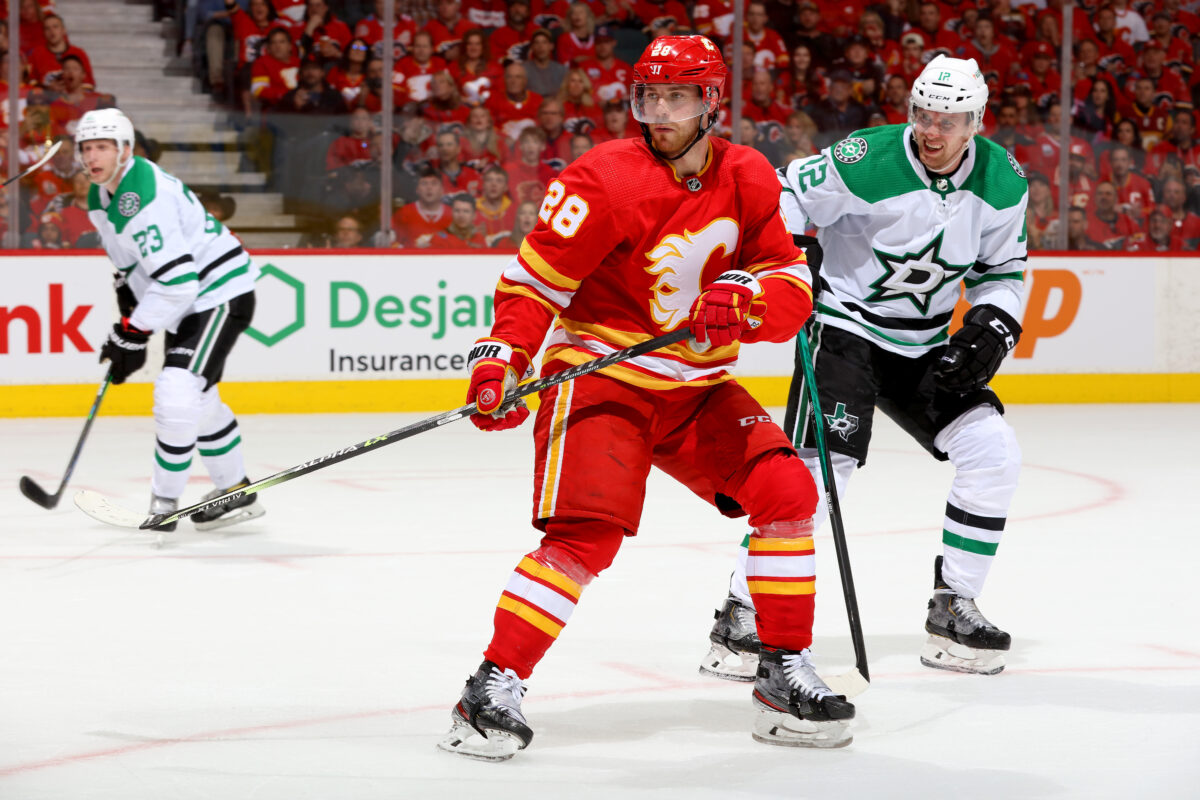
For comparison’s sake, the two players that finished with the same point total last season, Florida’s Sam Reinhart and St. Louis’ Vladimir Tarasenko, make $6.5 million and $7.5 million, respectively. Neither player provides their team with the defensive prowess that Lindholm does, however, and both aren’t entrusted to play the near 20 minutes a night that he does either. Lindholm’s deal unfortunately expires after the 2023-24 season, and surely a hefty raise will be in order should he continue his current level of play.
Noah Hanifin
The other half of the aforementioned 2018 trade with the Hurricanes, Noah Hanifin has also seen immense growth during his time in Alberta. The left-handed rearguard didn’t really pan out as a member of the Hurricanes, and like Lindholm, signed with the Flames immediately after being traded. His deal also sits at six years, but with a $29.7 million total valuation. That puts him at a $4.95 million average annual value (AAV), which looks like a bargain, especially after last season.
Hanifin emerged as a legitimate top-pairing defenseman alongside Rasmus Andersson, facing opposing teams’ top forward lines for 21:18 per night while also chipping in a career-high 48 points in 81 games. A wonderful defining trait of his is his discipline; Hanifin has accumulated a remarkable 61 total penalty minutes in his four years as a Flame, for a season average of about 18 minutes per 82 games, an impressive feat given how long he is on the ice.
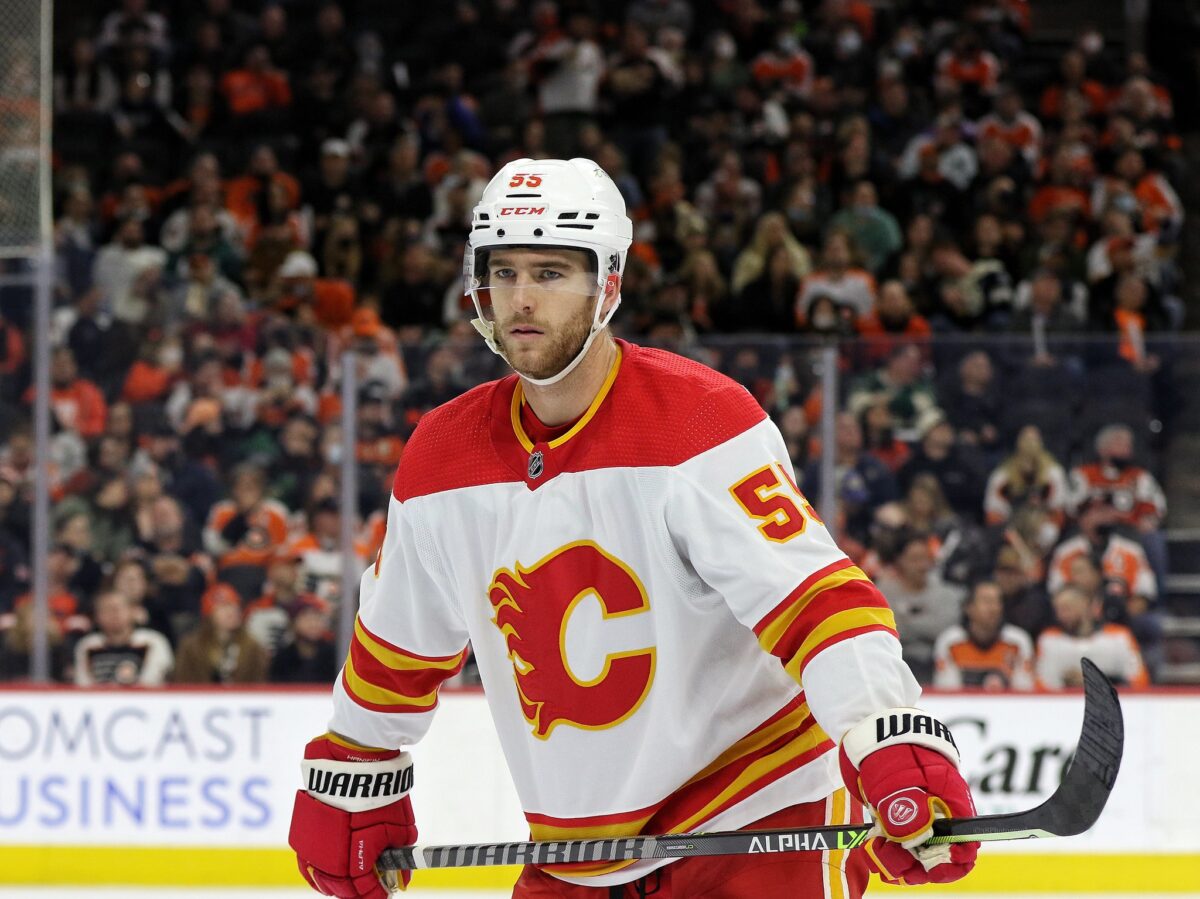
Comparing Hanifin to his peers paints a similar picture to Lindholm’s; defensemen that carry a similar AAV include Colorado’s Samuel Girard and former Flame and current Toronto Maple Leaf T.J. Brodie. Both men had more penalty minutes whilst also being 20 points shy of Hanifin’s 2021-22 total with 28 apiece. His plus/minus rating of plus-27 also came out on top amongst all three. In addition, his Corsi For rating of 56 percent was higher than either player, which means the Flames controlled puck possession whenever he was on the ice. His contract also provides value in that he is only 25 years old, staking an argument that he will only get better over its remaining two seasons. When it expires, he will likely be a highly sought-after player should the Flames not lock him up long-term, as he will be a 27-year-old, top-pairing defenseman.
Rasmus Andersson
Hanifin’s defensive partner on the top pairing is Rasmus Andersson. Drafted 53rd overall by the Flames in 2015, he has steadily worked his way up the depth chart in the years since. He led the team in total ice-time this past season, skating an average of 22:40 per night and scoring two more points than Hanifin to lead all Flames defensemen with 50. He also quarterbacked the team’s power play where he racked up 19 points, and sacrificed his body as well with 125 blocked shots and 63 hits.
An interesting fact about Andersson is that he was cursed by the shooting gods last season, scoring four times on 152 shots which equates to a 2.6 shooting percentage. Therefore, one could assume with a bit more puck luck he would be rippling the twine at a greater rate. All of this provides incredible value given that he only accounts for $4.55 million each year. He put pen to paper on a six-year, $27.3 million deal back in 2020, meaning that the Flames will have said positive value for four more seasons.
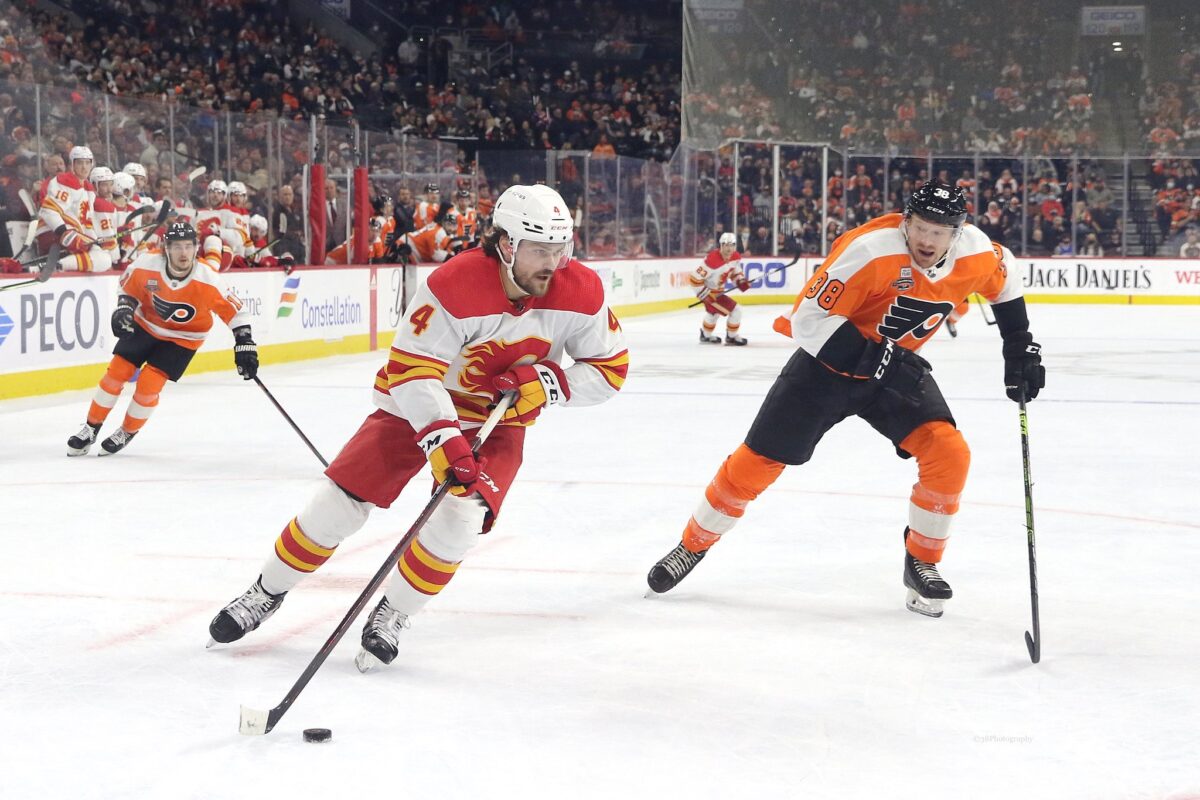
Continuing the trend, let’s take a look at some players that would seem similar to Andersson on the surface. Two that finished near his degree of production are Arizona’s Shayne Gostisbehere and Chicago’s Seth Jones. Both had one more point than Andersson with 51 each, however, Gostisbehere finished with a plus/minus rating of minus-23 and Jones registered a minus-37 while leading the league in total goals against. Both fall well short of Andersson’s plus-30 rating, and neither man came anywhere close to Andersson’s Corsi For percentage of 57.8. Financially, Gostisbehere’s contract matches Andersson’s at $4.5 million AAV but Jones makes a whopping $9.5 million AAV, making him all the more appealing.
Andrew Mangiapane
Next up is Toronto native Andrew Mangiapane. The second Flames draftee on our list, he was plucked off of the board in the same draft as Andersson albeit in the sixth round, 166th overall. He exploded offensively in 2021-22, scoring 35 times and adding 20 assists for 55 points and a plus-20 rating in 82 games, career-highs across the board for him. The winger had a sparkling Corsi For percentage of 58.7 which was bested by only Tkachuk and Nikita Zadorov. Furthermore, his eight game-winning goals also ranked him third on the Flames behind Lindholm and Gaudreau. Those who say his season was an outlier can look at his previous two; he recorded 0.57 points per game in 2020-21 and 0.47 in 2019-20 which are not too far off of last year’s 0.67, rather indicating a healthy annual progression that will hopefully continue for the 26-year-old in 2022-23.
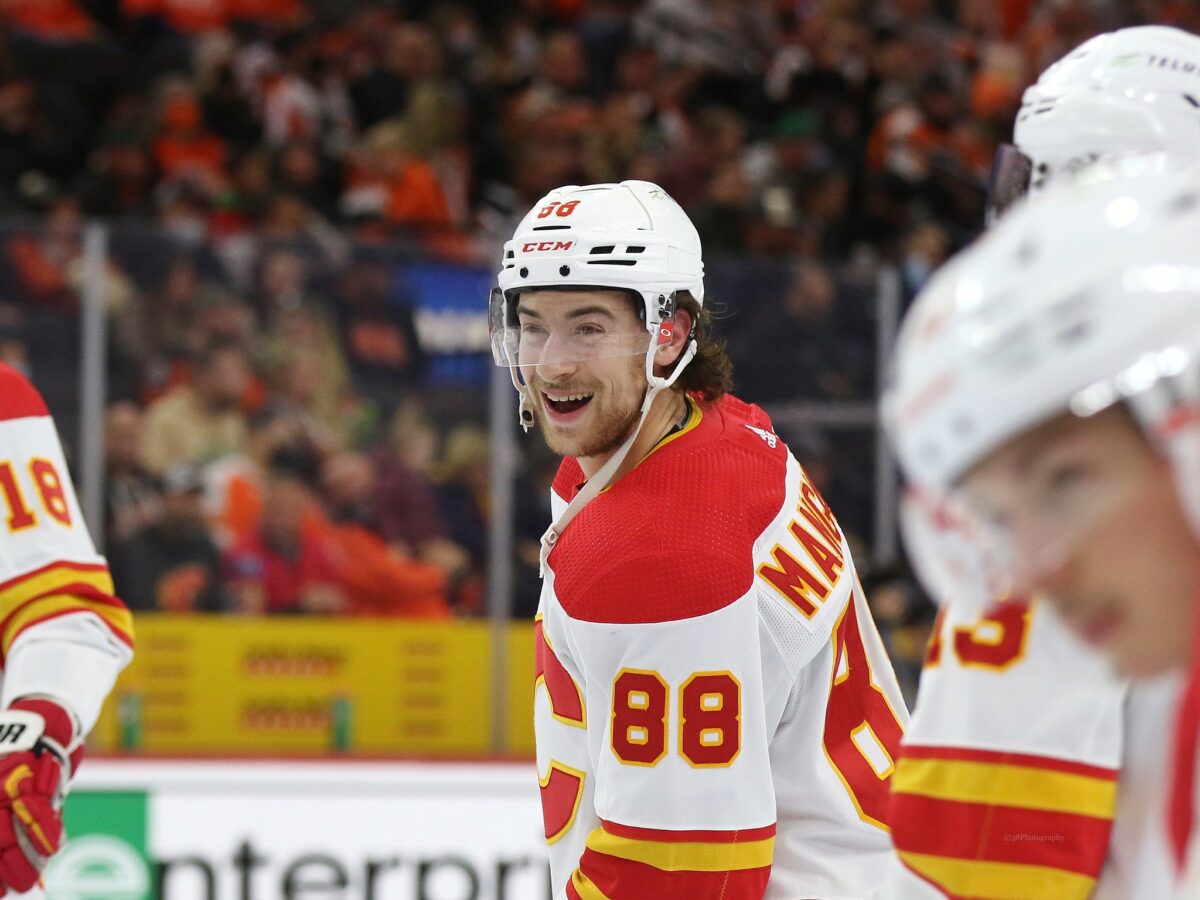
The recent contract extension Treliving signed Mangiapane to this offseason pays him $5.8 million each season for the next three years. Fair for both parties especially if he can continue to produce at a similar or greater rate over the length of his deal. Some offensive comparables to him are Ottawa Senators’ center Josh Norris and San Jose Sharks winger Timo Meier. Both scored the same 35 goals last season, and Norris also was just re-signed, however for a much larger eight-year, $63.6 million contract. Meier makes a closer $6 million AAV but registered a minus-3 rating and a Corsi For of 51.3. Mangiapane also scored his 35 goals in less ice time than either player; Norris played 18:39 per game and Meier 19:09 compared to Mangiapane’s 15:44. He will be relied upon more heavily this season with the departures of Gaudreau and Tkachuk, and with another big season, will make his contract one of the most valuable league-wide.
Jacob Markstrom
Jacob Markstrom may be 32 years old with four years left and a no-move clause, and his $6 million salary does take up 7.3 percent of the team’s available cap space. However, he came second in Vezina Trophy voting for the best goalie in the NHL last year which more than justifies his price tag.
Markstrom placed himself in the upper echelon of NHL goalies with his terrific 2021-22 season, recording a career-high 37 wins in 63 games, good for fourth in the league. His nine shutouts led all goalies, and he put up a .922 save percentage (SV%) to go along with a 2.22 goals-against average (GAA). Interestingly, he had three assists as well which was second for goalies behind only Frederik Andersen of the Carolina Hurricanes who had four. He was also given NHL Second-Team All-Star honours for his services. His 63 games played as a goalie was fourth in the NHL and such reliance hasn’t been seen in the Flames’ net since the Miikka Kiprusoff days when he played 70 in 2011-12 as a 35-year-old.
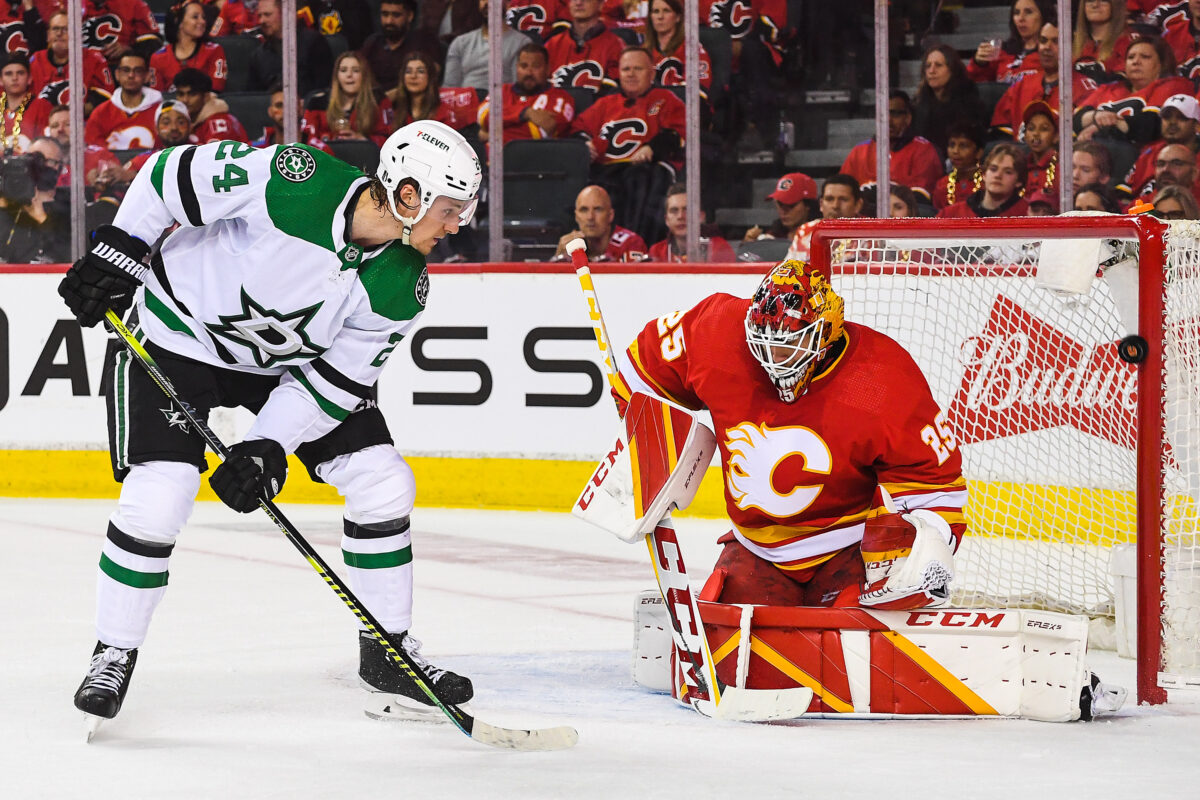
A few goalies that are close performance-wise to Markstrom are Tampa Bay’s Andrei Vasilevskiy and Florida’s Sergei Bobrovsky. Of course, Vasilevskiy has won two Stanley cups, making him a tougher comparison but on 2021-22 achievements alone, they are closer to equal. Vasilevskiy makes $3.5 million ($9.5 million AAV) more annually than Markstrom and had a lesser 2.49 GAA and .916 SV% with only two shutouts all year. Bobrovsky makes even more per year, coming in at $10 million AAV and is locked in for another four seasons at 33 years old. He recorded three shutouts, a .913 SV% and 2.67 GAA, falling even shorter of Markstrom’s figures. Both Markstrom and Bobrovsky had 137 goals scored against them, but Markstrom played nine more games and faced almost 200 more shots. So far so good for Markstrom’s contract, and if he can replicate his play from last season, his deal will look even greater for fans.
Again, lists like these change every season, someone who didn’t appear after 2021-22 may be number one in 2022-23, for example. To conclude, each contract on the roster can be picked apart and positively highlighted, but it is harder to do so for some players. These five make it immensely simple with their high quality of play for the Flames and thus appear as bargains for the time being.
